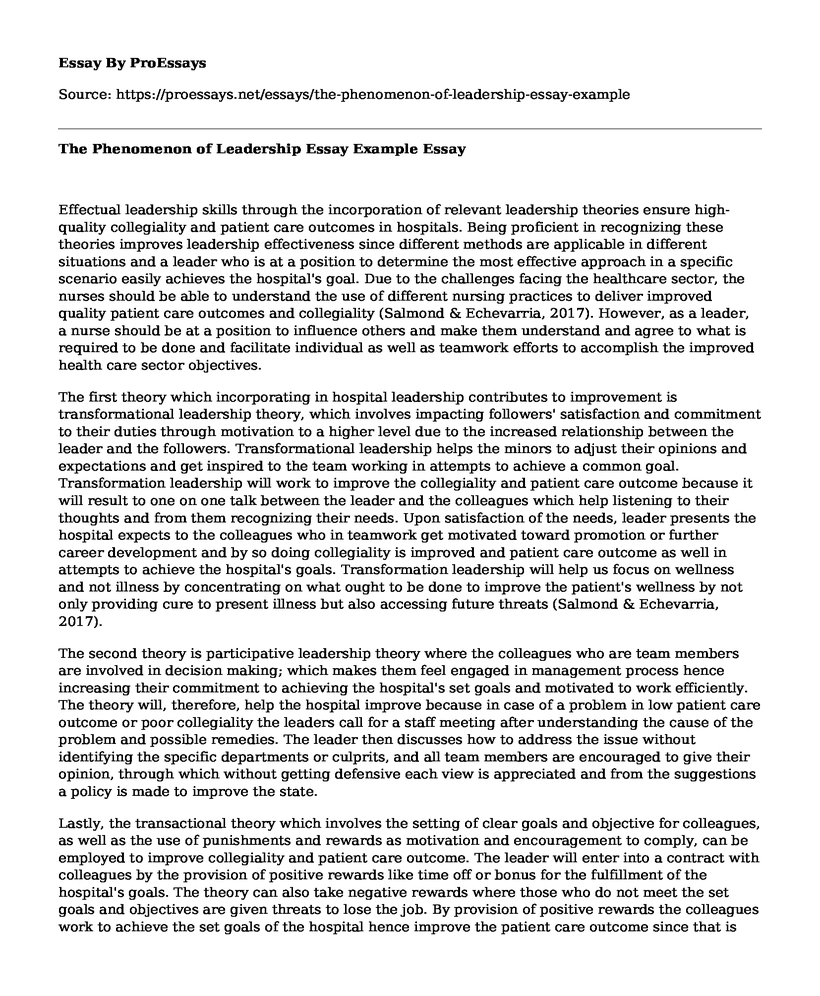Effectual leadership skills through the incorporation of relevant leadership theories ensure high-quality collegiality and patient care outcomes in hospitals. Being proficient in recognizing these theories improves leadership effectiveness since different methods are applicable in different situations and a leader who is at a position to determine the most effective approach in a specific scenario easily achieves the hospital's goal. Due to the challenges facing the healthcare sector, the nurses should be able to understand the use of different nursing practices to deliver improved quality patient care outcomes and collegiality (Salmond & Echevarria, 2017). However, as a leader, a nurse should be at a position to influence others and make them understand and agree to what is required to be done and facilitate individual as well as teamwork efforts to accomplish the improved health care sector objectives.
The first theory which incorporating in hospital leadership contributes to improvement is transformational leadership theory, which involves impacting followers' satisfaction and commitment to their duties through motivation to a higher level due to the increased relationship between the leader and the followers. Transformational leadership helps the minors to adjust their opinions and expectations and get inspired to the team working in attempts to achieve a common goal. Transformation leadership will work to improve the collegiality and patient care outcome because it will result to one on one talk between the leader and the colleagues which help listening to their thoughts and from them recognizing their needs. Upon satisfaction of the needs, leader presents the hospital expects to the colleagues who in teamwork get motivated toward promotion or further career development and by so doing collegiality is improved and patient care outcome as well in attempts to achieve the hospital's goals. Transformation leadership will help us focus on wellness and not illness by concentrating on what ought to be done to improve the patient's wellness by not only providing cure to present illness but also accessing future threats (Salmond & Echevarria, 2017).
The second theory is participative leadership theory where the colleagues who are team members are involved in decision making; which makes them feel engaged in management process hence increasing their commitment to achieving the hospital's set goals and motivated to work efficiently. The theory will, therefore, help the hospital improve because in case of a problem in low patient care outcome or poor collegiality the leaders call for a staff meeting after understanding the cause of the problem and possible remedies. The leader then discusses how to address the issue without identifying the specific departments or culprits, and all team members are encouraged to give their opinion, through which without getting defensive each view is appreciated and from the suggestions a policy is made to improve the state.
Lastly, the transactional theory which involves the setting of clear goals and objective for colleagues, as well as the use of punishments and rewards as motivation and encouragement to comply, can be employed to improve collegiality and patient care outcome. The leader will enter into a contract with colleagues by the provision of positive rewards like time off or bonus for the fulfillment of the hospital's goals. The theory can also take negative rewards where those who do not meet the set goals and objectives are given threats to lose the job. By provision of positive rewards the colleagues work to achieve the set goals of the hospital hence improve the patient care outcome since that is always the primary goal of and hospital and since they all want the reward, they will work as a team hence improving collegiality.
Reference
Salmond, S. W. & Echevarria, M. (2017). Healthcare transformation and changing roles for nursing. Orthopedic Nursing, 36(1), 12-25. Retrieved from https://www.ncbi.nlm.nih.gov/pmc/articles/PMC5266427/
Cite this page
The Phenomenon of Leadership Essay Example. (2022, Jul 28). Retrieved from https://proessays.net/essays/the-phenomenon-of-leadership-essay-example
If you are the original author of this essay and no longer wish to have it published on the ProEssays website, please click below to request its removal:
- Project Management - Business School Construction
- Essay Sample: 10 Most Critical Learning Points for Leaders
- Chick-n-Gravy Dinner Line Case Study
- Assignment Example: Compare Yourself to Your Leadership Leader
- Managing Innovation and Entrepreneurship Chapters Analysis Paper Example
- The McKinsey 7-S Model Paper Example
- Essay Example on Leadership in the Bible: Applying Biblical Principles for Success







